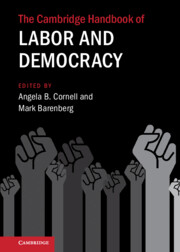12 results
Part V - Labor and Democracy Sectoral Case Studies: Platform Workers, Higher Education, and the Care Industry
-
- Book:
- The Cambridge Handbook of Labor and Democracy
- Published online:
- 25 January 2022
- Print publication:
- 20 January 2022, pp 305-350
-
- Chapter
- Export citation
Contents
-
- Book:
- The Cambridge Handbook of Labor and Democracy
- Published online:
- 25 January 2022
- Print publication:
- 20 January 2022, pp v-viii
-
- Chapter
- Export citation
Part II - History, Politics, and Law
-
- Book:
- The Cambridge Handbook of Labor and Democracy
- Published online:
- 25 January 2022
- Print publication:
- 20 January 2022, pp 85-160
-
- Chapter
- Export citation
Contributors
-
- Book:
- The Cambridge Handbook of Labor and Democracy
- Published online:
- 25 January 2022
- Print publication:
- 20 January 2022, pp ix-xiv
-
- Chapter
- Export citation
Part III - Labor, Diversity, and Democracy
-
- Book:
- The Cambridge Handbook of Labor and Democracy
- Published online:
- 25 January 2022
- Print publication:
- 20 January 2022, pp 161-234
-
- Chapter
- Export citation

The Cambridge Handbook of Labor and Democracy
-
- Published online:
- 25 January 2022
- Print publication:
- 20 January 2022
Part IV - Country and Regional Perspectives
-
- Book:
- The Cambridge Handbook of Labor and Democracy
- Published online:
- 25 January 2022
- Print publication:
- 20 January 2022, pp 235-304
-
- Chapter
- Export citation
Part I - Labor and Democracy: Theory and Practice
-
- Book:
- The Cambridge Handbook of Labor and Democracy
- Published online:
- 25 January 2022
- Print publication:
- 20 January 2022, pp 11-84
-
- Chapter
- Export citation
Copyright page
-
- Book:
- The Cambridge Handbook of Labor and Democracy
- Published online:
- 25 January 2022
- Print publication:
- 20 January 2022, pp iv-iv
-
- Chapter
- Export citation
Acknowledgments
-
- Book:
- The Cambridge Handbook of Labor and Democracy
- Published online:
- 25 January 2022
- Print publication:
- 20 January 2022, pp xv-xvi
-
- Chapter
- Export citation
Index
-
- Book:
- The Cambridge Handbook of Labor and Democracy
- Published online:
- 25 January 2022
- Print publication:
- 20 January 2022, pp 351-368
-
- Chapter
- Export citation
1 - A New Labor Law for Deep Democracy
- from Part I - Labor and Democracy: Theory and Practice
-
-
- Book:
- The Cambridge Handbook of Labor and Democracy
- Published online:
- 25 January 2022
- Print publication:
- 20 January 2022, pp 13-35
-
- Chapter
- Export citation

